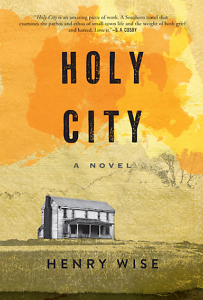This World of Broken Sins
A small-town deputy comes to terms with his past as he tries to save an innocent man
In his debut novel Holy City, Henry Wise offers up a complicated and occasionally compromised protagonist in Will Seems, a man haunted by his past mistakes. Everybody thinks they know why Will left Richmond, Virginia, and returned to his desolate home town — everybody, that is, except for Will himself. He’s not exactly fond of Euphoria County, where “coming back had been like digging out the dirt pinning a coffin in the ground.” And perhaps it goes without saying that the locals would rather their dead stayed buried.

Will is now a deputy with the Euphoria County Sheriff’s Department, at odds with nearly everyone else on staff. When he discovers the dead body of a former football star, Will wants to investigate, but the sheriff insists on charging a man who fled the scene: Zeke Hathom. There are two problems with this arrest as far as Will’s concerned. One, Zeke would never kill anybody. Two, Will owes this man’s family big time.
In Wise’s hands, memory is a weapon as dangerous as any knife. Most of the characters in Holy City would be better off forgetting their past sorrows, but with a foolhardy deputy and a stubborn private investigator from Richmond poking around, secrets keep coming to the surface. On one particularly low day, Will closes his eyes “against this world of broken sins.” Unfortunately, this small act does little to quell a rising tide of despair.
If Will has something of a poet’s knack for describing his misfortunes, the sheriff’s office dispatcher Tania cuts to the chase: “Things that don’t get said are just as true as those that do.” Tania’s plainspokenness is a welcome attribute in an office that runs on good-ole-boy connections. Euphoria County may be small, but its police department has enough ego for the entire state of Virginia.
Holy City uses an omniscient narrator, one at ease flitting into the minds of major and minor characters alike. This provides a multifaceted understanding of the crime, of how there’s no one victim, no one perpetrator, no one hero. The novel lives in the hour between dog and wolf where it’s impossible to tell prey from predator. The depictions of sexual assault almost veer into lurid but are saved by Wise’s elegiac tone. There’s a sense of mourning for everybody in Euphoria County, a mourning for who they could have been if born somewhere else.
 Perhaps this is most true of Will’s best friend Sam who was severely injured as a child. The trauma contributes to a life of pain and self-medication. When the story opens, Sam’s a fugitive, whereabouts unknown, but it quickly becomes clear that Will is both harboring Sam and supplying him with heroin. The goal is to wean Sam off his dependency and set him on a better path, but as with most of Will’s goals, this one is more wishful thinking than realistic planning.
Perhaps this is most true of Will’s best friend Sam who was severely injured as a child. The trauma contributes to a life of pain and self-medication. When the story opens, Sam’s a fugitive, whereabouts unknown, but it quickly becomes clear that Will is both harboring Sam and supplying him with heroin. The goal is to wean Sam off his dependency and set him on a better path, but as with most of Will’s goals, this one is more wishful thinking than realistic planning.
Sam’s mother Floressa should know a pipe dream better than anyone but tries to deceive herself too, convinced that staying in this godforsaken place is the right decision. “You could leave it,” she reasons, “but then what did you have to stand on? No one anywhere else understood it, this love and this hate, so you might as well stay here and live through it.” In this way, Floressa captures the ultimate secret of Euphoria County, that it’s a kind of meat hook that can’t be dislodged.
Wise writes in multiple genres, including poetry, and his deft prose captures the intensity of this rural setting plagued by poverty and violence. The book’s title comes from a nickname for Richmond, but the capital city’s pristine office buildings and charming walkable neighborhoods feel like an entirely different country than the one captured here. Perhaps most notably, Wise never shies away from the complicated racial dynamics of rural Virginia. He confronts historical and contemporary prejudices with candor, examining the privilege of his protagonist, however keen Will seems to throw away that privilege with his revenge fantasies.
Wise received his M.F.A. in creative writing from the University of Mississippi, and his writing has appeared in literary journals such as Shenandoah and Radar Poetry. Holy City is an unrelenting portrait of crime in rural America, and Wise is a welcome addition to the tradition of gritty Southern noir.

Erica Wright is the author of four crime novels and two poetry collections. Her essay collection Snake was released in 2020. Hollow Bones is forthcoming from Severn House in August 2024. Wright grew up in Wartrace, Tennessee, and now lives in Knoxville.


